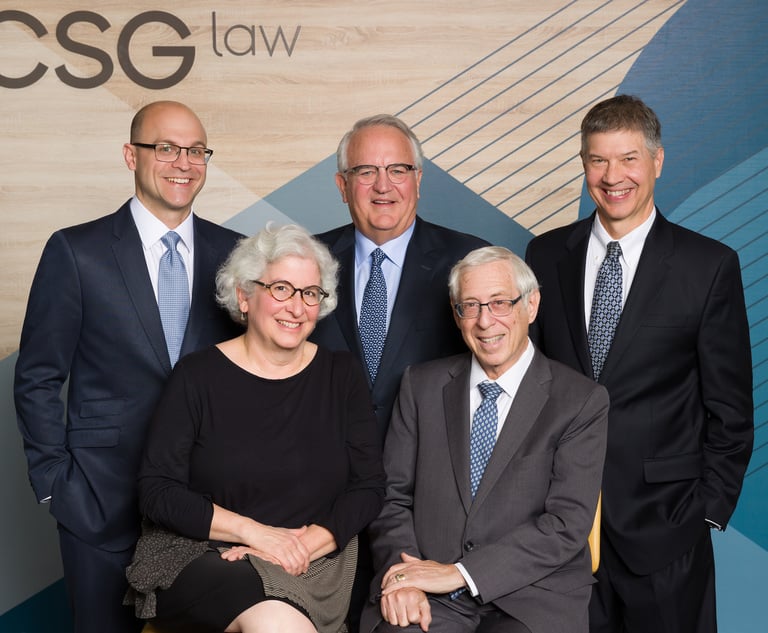 Brenda Liss
Brenda LissTop Women in Law: Brenda Liss
Brenda Liss, who for 30 years has been representing school districts and private and charter schools, was recently chosen as general counsel to the…
November 02, 2018 at 04:46 PM
3 minute read
Brenda Liss, who for 30 years has been representing school districts and private and charter schools, was recently chosen as general counsel to the Newark Public School District upon the conclusion of its 22-year period under state authority. She handled the state's first bond issue for a charter school, and has represented clients on many teacher tenure and school ethics matters. Her recent appellate matters include representation of charter schools in cases raising the issue of enrollment increases and their alleged impact on racial makeup of public schools. Liss previously was executive director of the Rutgers Institute on Education Law and Policy,
What's your single best piece of advice for handling a crisis?
“Remain calm” and “trust your instincts” are important, but the single best piece of advice is to have a crisis plan in place before a crisis occurs and remember to refer to that plan when it does, because you may very well fail to remain calm and your instincts may very well fail you.
Name a mentor or someone you admire, and why.
Steven Hoskins, a partner at McCarter & English, was my mentor for 16 years. He taught me the importance of knowing the substantive law well (he had encyclopedic knowledge of every provision of the New Jersey school laws) but that even when you do, and even when you're the smartest and most knowledgeable person in the room, you still won't have all the answers, so humility is a virtue. He pushed me to always do the very best work I could and encouraged me to be confident in my ability. And he taught me that it's possible to be both a good lawyer and a good—kind, considerate, generous—person.
Best advice you ever got…
“Maybe you should go to law school …,” my mother said.
What has the #MeToo movement meant to the legal profession?
Aside from causing a potential surge in sexual harassment claims and therefore more work for employment lawyers on both sides, the #MeToo movement's impact on the legal profession is the same as its impact on our culture generally: women have been encouraged to speak up when they're harassed and about harassment they've suffered in the past; and men have been warned that inappropriate conduct may not be tolerated, and any such conduct could come back to haunt them long after they thought it was forgotten. However, women also have been shown that even when their testimony about harassment (or worse) is credible and credited, the decision-maker may reject it nevertheless and the conduct may go unpunished. The result, unfortunately, may be that our faith that justice will prevail has been diminished. That can't be good for the legal profession.
In 50 words or less, what does the legal profession need to do to improve opportunities for women lawyers?
The legal profession needs to exert its influence to allow and encourage men to be supportive partners of hard-working, ambitious women, so that women lawyers and those in other professions can pursue their careers and also have happy, healthy family lives to the same extent that men can do so.
This content has been archived. It is available through our partners, LexisNexis® and Bloomberg Law.
To view this content, please continue to their sites.
Not a Lexis Subscriber?
Subscribe Now
Not a Bloomberg Law Subscriber?
Subscribe Now
NOT FOR REPRINT
© 2024 ALM Global, LLC, All Rights Reserved. Request academic re-use from www.copyright.com. All other uses, submit a request to [email protected]. For more information visit Asset & Logo Licensing.
You Might Like
View All
Appellate Div. Follows Fed Reasoning on Recusal for Legislator-Turned-Judge
4 minute read
Chiesa Shahinian Bolsters Corporate Practice With 5 From Newark Boutique
5 minute read
'A Mockery' of Deposition Rules: Walgreens Wins Sanctions Dispute Over Corporate Witness Allegedly Unfamiliar With Company
Trending Stories
- 1Formal Charges Filed Against Judge Accused of Helping Defendant Escape ICE Detention
- 2Top 10 Predicted Business and Human Rights Issues for 2025
- 3$7.5M in Punitive Damages Awarded in Product Liability Case
- 4Does My Company Really Need a Generative AI Policy?
- 5'This Is a Watershed Moment': Daniel's Law Overcomes Major Hurdle
Who Got The Work
Michael G. Bongiorno, Andrew Scott Dulberg and Elizabeth E. Driscoll from Wilmer Cutler Pickering Hale and Dorr have stepped in to represent Symbotic Inc., an A.I.-enabled technology platform that focuses on increasing supply chain efficiency, and other defendants in a pending shareholder derivative lawsuit. The case, filed Oct. 2 in Massachusetts District Court by the Brown Law Firm on behalf of Stephen Austen, accuses certain officers and directors of misleading investors in regard to Symbotic's potential for margin growth by failing to disclose that the company was not equipped to timely deploy its systems or manage expenses through project delays. The case, assigned to U.S. District Judge Nathaniel M. Gorton, is 1:24-cv-12522, Austen v. Cohen et al.
Who Got The Work
Edmund Polubinski and Marie Killmond of Davis Polk & Wardwell have entered appearances for data platform software development company MongoDB and other defendants in a pending shareholder derivative lawsuit. The action, filed Oct. 7 in New York Southern District Court by the Brown Law Firm, accuses the company's directors and/or officers of falsely expressing confidence in the company’s restructuring of its sales incentive plan and downplaying the severity of decreases in its upfront commitments. The case is 1:24-cv-07594, Roy v. Ittycheria et al.
Who Got The Work
Amy O. Bruchs and Kurt F. Ellison of Michael Best & Friedrich have entered appearances for Epic Systems Corp. in a pending employment discrimination lawsuit. The suit was filed Sept. 7 in Wisconsin Western District Court by Levine Eisberner LLC and Siri & Glimstad on behalf of a project manager who claims that he was wrongfully terminated after applying for a religious exemption to the defendant's COVID-19 vaccine mandate. The case, assigned to U.S. Magistrate Judge Anita Marie Boor, is 3:24-cv-00630, Secker, Nathan v. Epic Systems Corporation.
Who Got The Work
David X. Sullivan, Thomas J. Finn and Gregory A. Hall from McCarter & English have entered appearances for Sunrun Installation Services in a pending civil rights lawsuit. The complaint was filed Sept. 4 in Connecticut District Court by attorney Robert M. Berke on behalf of former employee George Edward Steins, who was arrested and charged with employing an unregistered home improvement salesperson. The complaint alleges that had Sunrun informed the Connecticut Department of Consumer Protection that the plaintiff's employment had ended in 2017 and that he no longer held Sunrun's home improvement contractor license, he would not have been hit with charges, which were dismissed in May 2024. The case, assigned to U.S. District Judge Jeffrey A. Meyer, is 3:24-cv-01423, Steins v. Sunrun, Inc. et al.
Who Got The Work
Greenberg Traurig shareholder Joshua L. Raskin has entered an appearance for boohoo.com UK Ltd. in a pending patent infringement lawsuit. The suit, filed Sept. 3 in Texas Eastern District Court by Rozier Hardt McDonough on behalf of Alto Dynamics, asserts five patents related to an online shopping platform. The case, assigned to U.S. District Judge Rodney Gilstrap, is 2:24-cv-00719, Alto Dynamics, LLC v. boohoo.com UK Limited.
Featured Firms
Law Offices of Gary Martin Hays & Associates, P.C.
(470) 294-1674
Law Offices of Mark E. Salomone
(857) 444-6468
Smith & Hassler
(713) 739-1250







